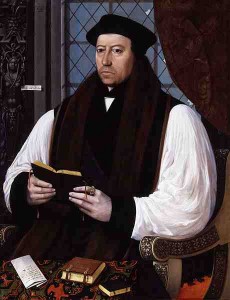 On 3rd May 1536 Archbishop Cranmer wrote a letter to King Henry VIII expressing his shock at the arrest of Queen Anne Boleyn, a woman who had acted as his patron and who was his friend:
On 3rd May 1536 Archbishop Cranmer wrote a letter to King Henry VIII expressing his shock at the arrest of Queen Anne Boleyn, a woman who had acted as his patron and who was his friend:
“Have come to Lambeth, according to Mr. Secretary’s letters, to know your Grace’s pleasure. Dare not, contrary to the said letters, presume to come to your presence, but of my bounden duty I beg you “somewhat to suppress the deep sorrows of your Grace’s heart,” and take adversity patiently. Cannot deny that you have great causes of heaviness, and that your honor is highly touched. God never sent you a like trial; but if He find you no less patient and thankful than when all things succeeded to your wish, I suppose you never did thing more acceptable to Him. You will give Him occasion to increase His benefits, as He did to Job.
If the reports of the Queen be true, they are only to her dishonor, not yours. I am clean amazed, for I had never better opinion of woman; but I think your Highness would not have gone so far if she had not been culpable. I was most bound to her of all creatures living, and therefore beg that I may, with your Grace’s favor, wish and pray that she may declare herself innocent. Yet if she be found guilty, I repute him not a faithful subject who would not wish her punished without mercy. “And as I loved her not a little for the love which I judged her to bear towards God and His Gospel, so if she be proved culpable there is not one that loveth God and His Gospel that ever will favor her, but must hate her above all other; and the more they favor the Gospel the more they will hate her, for then there was never creature in our time that so much slandered the Gospel; and God hath sent her this punishment for that she feignedly hath professed his Gospel in her mouth and not in heart and deed.” And though she have so offended, yet God has shown His goodness towards your Grace and never offended you. “But your Grace, I am sure, knowledgeth that you have offended Him.” I trust, therefore, you will bear no less zeal to the Gospel than you did before, as your favor to the Gospel was not led by affection to her. Lambeth, 3 May.
Since writing, my lords Chancellor, Oxford, Sussex, and my Lord Chamberlain of your Grace’s house, sent for me to come to the Star Chamber, and there declared to me such things as you wished to make me privy to. For this I am much bounden to your Grace. They will report our conference. I am sorry such faults can be proved against the Queen as they report.”1
Cranmer must have spent hours working on this letter. He had to balance his defence and support of the queen with his allegiance to the king. Beth von Staats, in her book Thomas Cranmer: In a Nutshell, writes that this letter is evidence of Cranmer’s “political naivety” and that “His first response was to plead to the benevolence of King Henry VIII by composing a letter to him.” She goes on to say that “Though some view the letter’s prose to be a condemnation of his close friend Queen Anne Boleyn, it is actually an example of highly cautious advocacy. Though he could plant a seed of doubt, Cranmer was wise enough to know not to question the king’s decision-making.”2 Cranmer’s biographer Diarmaid MacCulloch writes of how this letter and Cranmer’s handling of the situation show his wisdom and courage, rather than his cowardice as some suggest.3 Cranmer definitely knew how to handle the King and when not to question the King’s actions. Angering the King would not have helped Anne.
Also on 3rd May 1536, Sir William Kingston, Constable of the Tower of London, wrote his first report to Thomas Cromwell regarding Anne Boleyn’s imprisonment in the Tower of London. Click here to read more about this.
Notes and Sources
- Letters and Papers, Foreign and Domestic, Henry VIII, Volume 10 – January-June 1536, 792
- von Staats, Beth (2015) Thomas Cranmer: In a Nutshell
- MacCulloch, Diarmaid (1998) Thomas Cranmer: A Life, 157.